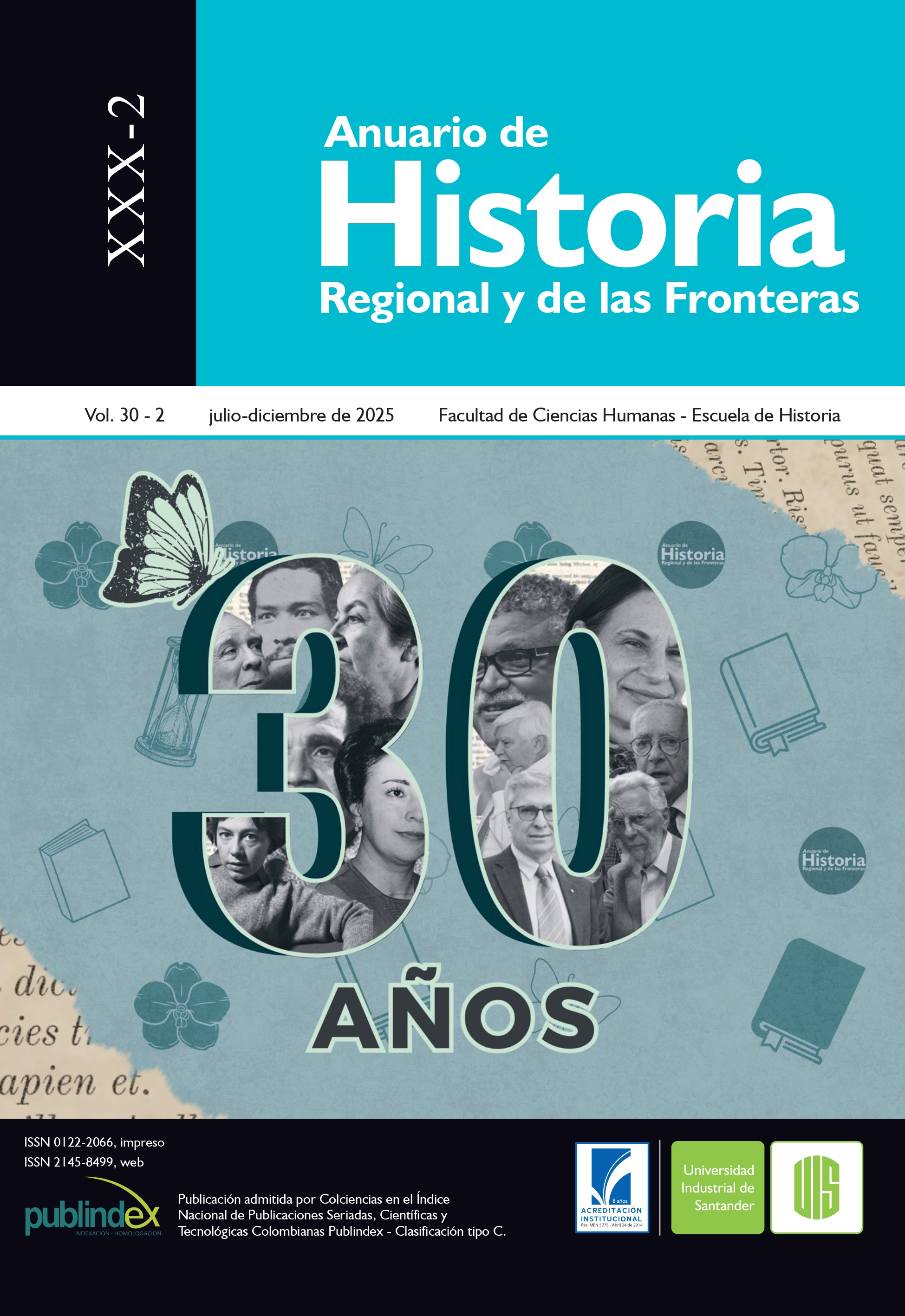A Condemned Archive: I, a reader vs. I the Supreme (1974) by Augusto Roa Bastos
Published 2025-07-28
Keywords
- archives,
- Latin America,
- power,
- dictatorship,
- Augusto Roa Bastos
- intertextuality,
- historical narrative ...More
How to Cite
Copyright (c) 2025 Anuario de Historia Regional y de las Fronteras

This work is licensed under a Creative Commons Attribution 4.0 International License.
Abstract
This article analyzes Augusto Roa Bastos' Yo el Supremo (1974) as a fictional archive that explores the relationship between language, power, writing and memory in Latin America. The novel, an example of the New Historical Novel, adopts a dialogic and polyphonic structure, combining narrative, political and historical elements. Through various voices, such as that of the dictator, his scribe and the mysterious «Corrector», it deals with authority, authorship and the permanence of language. Language functions not only as an instrument of dominion, but also as a prison. Here, the reader plays an active role in the construction of meaning, helping the novel question its critical reception and reflecting on the limits and possibilities of textual creation in historical memory. In doing so, Yo el Supremo is proposed as a hybrid text that represents memory and archive in Latin American history.
Downloads
References
- Austin, John Langshaw. How to Do Things with Words. Editado por James O. Urmson y Marina Sbisa, 2. ed., [Repr.]. Cambridge: Harvard University Press, 2009.
- Carini, Sara. «Deconstrucción del discurso histórico y reconstrucción de la memoria colectiva en Yo El Supremo, de Augusto Roa Bastos». En Cuadernos de Aleph 3 (2011): 39–56.
- De la Torre Rangel, Jesús Antonio. «Yo el Supremo, de Roa Bastos. Sobre el poder y el derecho en el mito del Doctor Francia». En Interpretatio: Revista de hermenéutica 6.2 (2021): 17–34.
- Derrida, Jacques. Archive Fever: A Freudian Impression. Paperback ed., [Nachdr.]. Chicago: University of Chicago Press, 2015.
- Ezquerro, Milagros. «Introducción». Yo el Supremo, de Augusto Roa Bastos, editado por Milagros Ezquerro, 11ma ed. Madrid: Cátedra, 2018, pp. 9–84.
- Menton, Seymour. «Latin America’s New Historical Novel: Definitions and Origins». Latin America’s New Historical Novel, de Seymour Menton, 1. Ed. Austin: University of Texas Press, 1993, 14–38.
- Francia, José Gaspar Rodríguez de. Francia. Editado por Guido Rodríguez Alcaláet al., Ed. comentada, aum.corr. De la colección Doroteo Bareiro del Archivo Nacional de Asunción, Editorial Tiempo de Historia, 2009.
- Iser, Wolfgang. Der Akt des Lesens: Theorie ästhetischer Wirkung. München: W. Fink,1976.
- Issorel, Jacques. «Las dos caras de la reflexión sobre el lenguaje en ‘Yo el Supremo’ de Augusto Roa Bastos». Monteagudo, 1978. digitum.um.es, https://digitum.um.es/digitum/handle/10201/15097.
- Le Tallec-Lloret, Gabrielle. «De la autoridad en Yo, el Supremo de A. Roa Bastos: dictador, autor, locutor». En Nuevos caminos del hispanismo...: actas del XVI Congreso de la Asociación Internacional de Hispanistas, vol. 2, 2010, pág. 244.
- Iberoamericana Vervuert, 2010. dialnet.unirioja.es, https://dialnet.unirioja.es/servlet/articulo?codigo=3360928
- Ostrov, Andrea. «Lenguaje, performatividad y poder en Yo El Supremo de Augusto Roa Bastos». Revista de crítica literaria latinoamericana 78 (2013): 273–98.
- Peiró Barco, José Vicente. «Augusto Roa Bastos: La mejor tarjeta de visita al Paraguay». Pykasu, 1, (2017): 14–17. portalguarani.com, https://www.portalguarani.com/1002_jose_vicente_peiro_barco/33754_augusto_roa_bastos_la_mejor_tarjeta_de_visita_de_paraguay__por_jose_vicente_peiro__paginas_14_al_17__pykasu_n_1_revista_digital__mayo_2017.html
- Querejazu Calvo, Roberto. Masamaclay: historia política, diplomática y militar de la Guerra del Chaco. 2. ed. La Paz: Editorial Los Amigos del Libro, 1975.
- Rama, Ángel. La ciudad letrada. Montevideo: ARCA, 1984.
- Suárez, Victorio V. «Entrevista a José Vicente Peiró Barco». Proceso de la literatura paraguaya: perfil histórico, bibliografía y entrevistas a los más destacados escritores paraguayos, de Victorio V. Suárez, Criterio Ediciones, 2006. https://www.portalguarani.com/1002_jose_vicente_peiro_barco.html#portalobras

